by Kevin Letts

For a class assignment on world views, I wrote the following world view critique on the movie Sherlock Holmes (2009), staring Robert Downey, Jr. and Jude Law. This movie mostly shows a spiritualistic existential world view. An existential world view, in a nutshell, is to find meaning in life. For some, it is science. In the case of Holmes and Watson, it is science and fighting crime. A spiritual aspect of this means to believe that there is a spiritual realm without knowing what exactly is out there.
There are 8 world view questions answered for this essay:
What is truly real?
What is the nature of external reality?
What is a human being?
What happens after death?
Is it truly possible to know anything or any truth at all?
What is morality?
Is history important?
What personal, life-orienting core commitments are consistent with the world view?
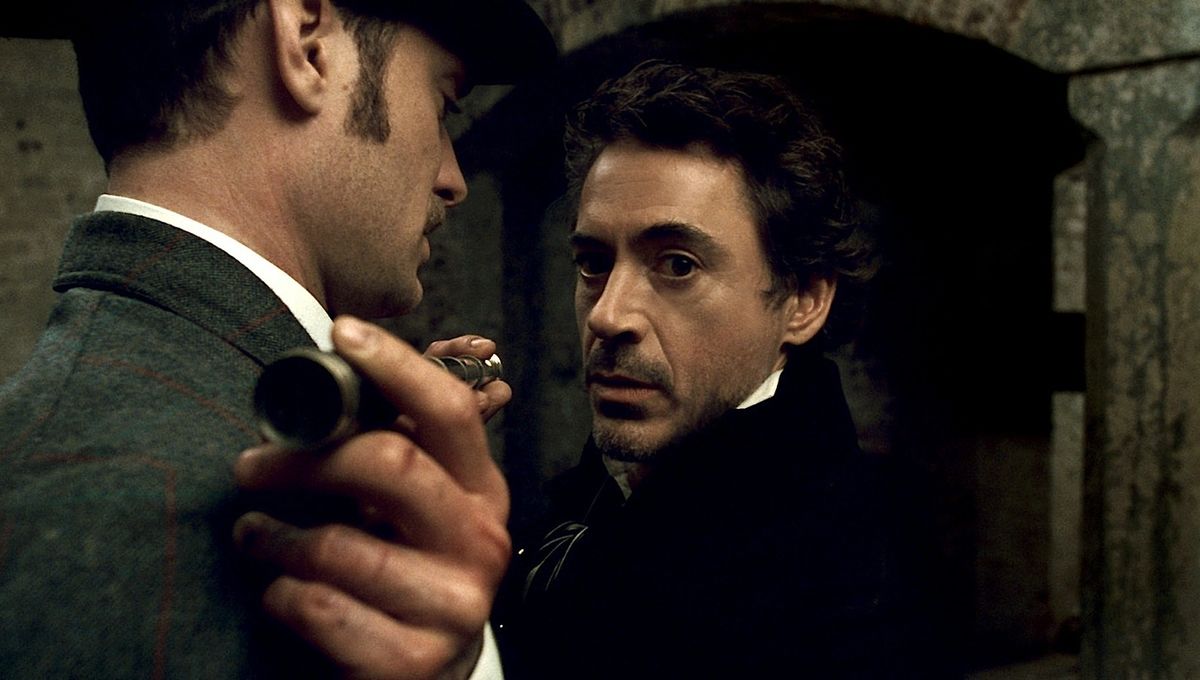
What is prime reality? What is truly real?
The two main protagonists in this movie rely very much on science. In the beginning of the movie, we see a woman who was about to be a victim of a sacrifice. She is under the influence of a drug and Dr. Watson sees this and tells the police that she needs a hospital immediately and not a minister for prayer. We also see Holmes shooting a gun in his rooms while trying to make a sound suppressor for a gun. My point is they are devotees of science.
Throughout the movie, Holmes talks of wanting facts. A famous quote from the Canon is “Data! Data! Data! I can't make bricks without clay.” While following a lead, Watson suggests a possible supernatural answer while Holmes replies that he is not opposed to the idea but wishes to have as many facts as he can before jumping to a supernatural conclusion. When Blackwood is reported to rise from the grave, Holmes’s first words are “What are the facts?” Throughout the movie Holmes always relies on solid facts to answer questions.
At the end of the movie, Holmes not only dismisses the idea of the supernatural but shows conclusively how everything is done through science and not supernatural powers.
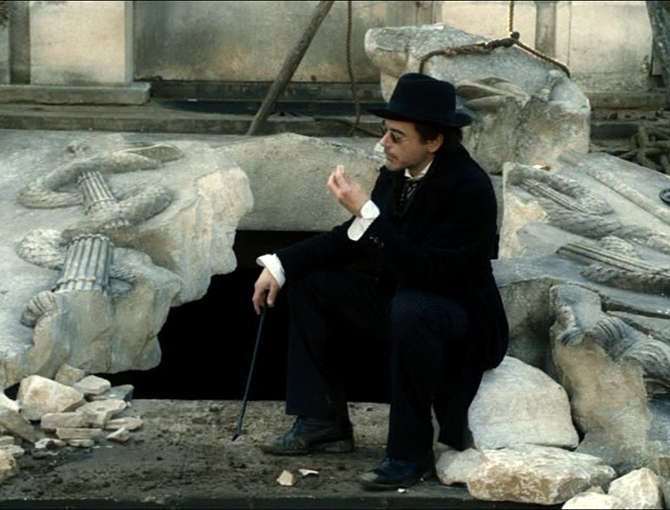
What is the nature of external reality?
Much like the answer to question one, scientific law is a big factor to determining what the world is around us. In science, the world is orderly and, using scientific laws, the world around us can be manipulated to a certain extent. Lord Blackwood, using science, has his followers drink their loyalty to him before he attempts to murder all of parliament. It turns out this drink had an antidote that would have kept them immune from the poisonous gas released in parliament. Because Holmes, Watson, and Adler interfered, the plan was foiled. It was not a failure on Blackwood’s part. His science was accurate and correct, but the protagonists interfered with the procedure.
Is there a supernatural aspect to the world in this movie? What do the characters believe? Lord Blackwood, before his first hanging (the one he managed to fake), said “Death is only the beginning.” However, he knew he was not going to die. He survived the hanging by an apparatus around his chest and back that took most of the force that would have broken his neck and chocked him and took a drug that slowed his heart beat to the point where it seemed like he was dead. His resurrection, itself, was achieved by breaking the stone that covered his grave and then using an adhesive to glue it back together but then would wash away in the rain so no one would see it. That, plus Holmes showing the world how Blackwood demonstrated his ‘powers’ were nothing more than illusions caused by science gives the idea that there is no supernatural but just the appearance of it.
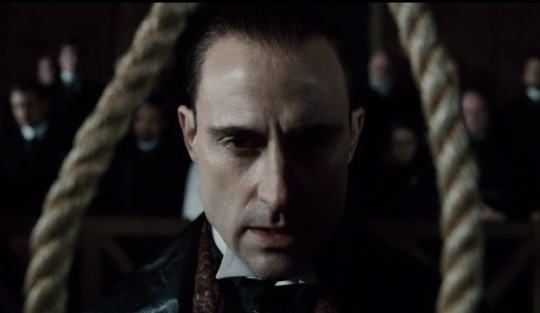
What of the main religion of the general populous at the time of this story? It is mostly Christianity. As we see above, it seems that science is the main belief of the protagonists and antagonists. There are priests and religious people in many parts of the movie. How are Christian theists seen in this movie? For the most part, not in a positive light. One example is when Blackwood was waiting for his execution. Outside his jail, there are many people, some in clerical clothing, holding up crosses and signs that has apocalyptic sayings and Scripture verses, mostly from Revelation. They are shouting about the end times and how Blackwood is of the devil. They looked rather unorganized and near riotous. At another point, Holmes laments, after a hotel chambermaid finds him naked and tied to a bed. who screams and runs out apparently offended and thinking Holmes was making a sexual pass at her, “That’s why I find this modern religious fervor so troubling…” because people do not have open minds. Near the end of the movie when Blackwood addresses Parliament and gives members of Parliament one more chance to follow him, there are more religious ‘protesters’ outside holding up crosses and yelling apocalyptically. Blackwood tells the members of Parliament, “Listen to the rabble outside. Listen. Listen to the fear. I will use that as a weapon to control them, and then the world.” Those who hold a Christian theist view are not looked upon well in this movie which may make one believe the protagonists and antagonists really do not believe in the supernatural, but science.
With that said, however, Watson, during the start of their investigations, tells Holmes about odd things he had seen while he was in the British army that baffled him. He says he knew a man who was able to predict his death down to the number of bullets that killed him and their placement. He says to Holmes, “You have to admit, Holmes, that a supernatural explanation to this case is theoretically possible.” Holmes replies, “Well, agreed, but it is a huge mistake to theorize before one has enough data. Inevitably, one begins to twist facts to suit theories instead of twisting theories to suit facts.” Here, we see Holmes and Watson suggesting that there is something more than what is seen, but, before concluding the supernatural, look at the facts, first, and see if there is a scientific, materialistic, reason to what is happening. They do not show atheistic views, per se, but more of an agnostic and spiritual existential worldview in that they believe something, or someone, is out there, but they are not sure what or who. Near the climax of the movie, Holmes goes through the rituals of the Temple and, after finishing, he gives a brief presentation of his conclusions to Watson and Adler. As he starts, he says, “…I may well have reconciled thousands of years of theological disparity, but that’s for another time.” He describes his journey through these rituals as deeper than he has even gone before but has emerged “enlightened.” It appears he, as well as Watson, believes in a spiritual realm and maybe even truths, but he reserves that for another time.

What is a human being?
What is a human being in these movies? As seen above, there is a belief that there is more to a human being than just a fleshy machine that acts on its own with no spirit inside the machine. The supernatural, though faked, is seen as an important factor in this movie and the belief that there is something more to a human than the physical appears to be a possibility if not believed. To Lord Blackwood, the victims of his sacrifices were “five otherwise meaningless creatures called to serve a greater purpose.” They meant nothing to him except a means for him to take over the Temple of the Four Orders, the government of Great Britain, then the world.
Holmes shows a desire for helping humanity in a couple ways. One, when he visits Blackwood in his cell before execution, Holmes replies to Blackwood’s disregard for his victims by asking if they (scientists) will be allowed to dissect Lord Blackwood’s brain for deformities. Then, he, Blackwood, “would serve a greater purpose.” Holmes shows his value of humanity in general when brought to meet Lord Rotheram (Blackwood’s father) to hire him to stop Blackwood. Holmes says he can choose his clients and for a fee. He says he will stop Blackwood but not for them and not for a fee. He knows Blackwood is a danger to humanity and must be stopped.

Holmes does show that he values some people above others. He, obviously, has affection for Watson but also for Irene Adler (even though he does not trust her). Watson is his best (if not his only) friend. Meanwhile, Holmes shows little concern for people like Lord Rotheram when he reminds Rotheram, rather as a matter of fact, that everyone in Blackwood’s family winds up dead. When Rotheram is found dead a day or two later, Holmes is brought to the scene of the incident and shows no sorrow or remorse for the death. He does not lament that he should have done something to warn him or advise him to keep him alive. He treated it more as a normal crime scene and a puzzle to solve.
Watson’s view of humanity is that people should be valued. As a doctor, he showed great care for his patients and even some of those who followed Blackwood. While fighting some of Blackwood’s henchmen, he put them in a choke hold or, in some cases, a ‘sleeper’ hold which renders the opponent unconscious but not dead. Each time he does this, he checks his opponent’s pulse to make sure they are still alive.
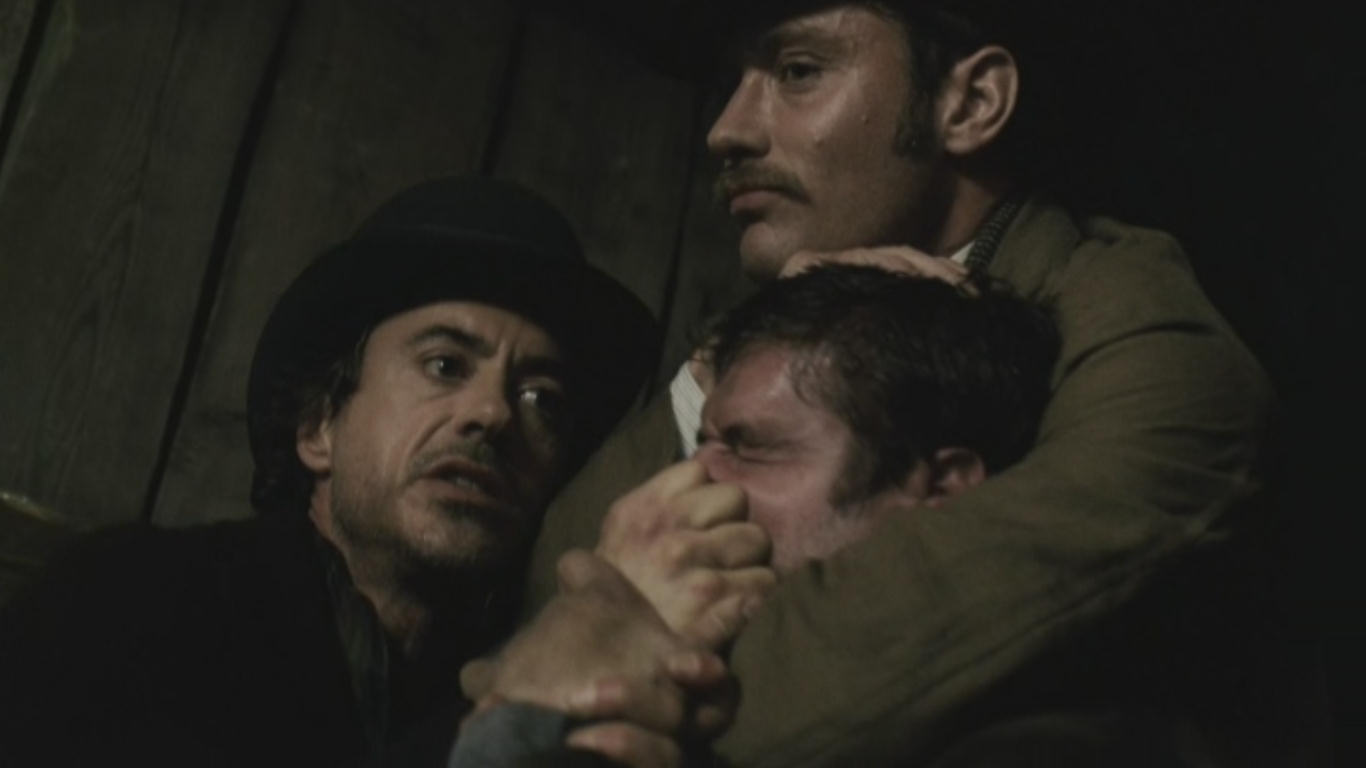
What happens to someone after they die?
In this movie, there is no real discussion of what happens after someone does except for those who follow Blackwood or are convinced he resurrected himself. Neither Holmes nor Watson give any real theories to life after death, heaven, hell, limbo, or becoming one with the universe (like the Star Wars Force). As mentioned above, Lord Blackwood says “death is only the beginning” with confidence because he knew he was not going to die. At the end of the movie, however, when he thought he was going to die; Blackwood cries out to Holmes to save him. Obviously, real death was not the beginning he was looking for and he was scared to die because he does not know what really happens to someone after death. One could argue that the message of life after death is that it is truly unknown or there is nothing after death. At first, the idea of resurrection from the grave seems absurd to Holmes and Watson. After visiting Blackwood’s grave, Watson starts to wonder, but Holmes stays resolute to look for a scientific explanation before looking into the possibility of someone rising from the grave.
![Lord Blackwood - Sherlock Holmes (2009) [x] “ And I? What will I ...](https://i.pinimg.com/736x/a7/99/df/a799dfc3eee3ecc6440a79266a8ee79d.jpg)
Is it possible to know anything at all?
Again, science is the ultimate way to know if anything is true, has purpose, or not. Holmes repeatedly talks of relying on facts. He wants to know what the facts are and then he forms his theories. Like he told Watson when asked about a supernatural possibility, that he prefers to look at the facts and mold theories around the facts rather the facts around the theories. Then, as referenced above, he emerges enlightened after going through the Temple’s rituals and believes he has reconciled millennia of theological disparity. In existential thinking, an individual must not allow natural law to rule them and make them nothing but a senseless spot in the universe but make something of themselves. The individual must find their own meaning. So, despite the science, they must make their own purpose. They make their own purpose in life. Lord Blackwood says that it is his purpose to take over the world and make the British Empire strong again and to last for millennia. Even with science, he believes it is his purpose to make England strong again and to rule it.
Like mentioned above, Holmes talks about wanting Blackwood’s brain for research to serve a greater purpose. To him, science and solving crimes is his purpose in life. In this movie, he tries to make a sound suppressor for a gun and, also tries to manipulate flies while playing various chords on his violin and, through musical theory, create order out of chaos. Commentators on both the Holmes of the movie and in the canon have said that solving crime and science are his purposes in life.
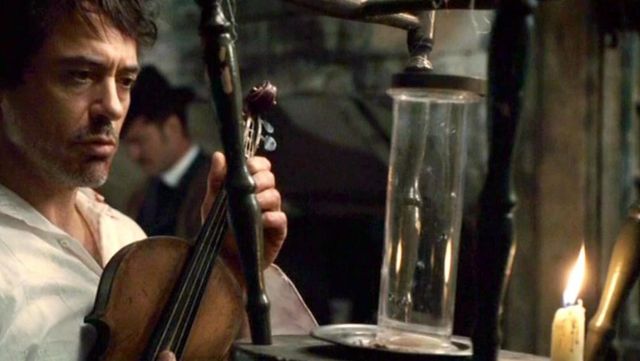
What is morality? How do we know what is right and wrong?
Holmes and Watson believe in justice. They do follow the law and they do believe in following it to a point. However, when all is said and done, they believe in justice more, even if it means breaking the law. Holmes is willing to break and enter to solve the crime and catch a wicked person who has murdered before, is still murdering, and, he comes to find out later, ready to murder hundreds more to become ruler of the world. He does this with Watson as they find the first lab used by Blackwood’s henchmen, then does it again by trying to break into Irene Adler’s hotel room to get her away from harm. Holmes shows he is dedicated to fighting crime on his own terms. He tells the leaders of the Temple of the Four Orders after they offer to hire him that he will stop Blackwood that he chooses his own clients but will stop Blackwood because he knows he is a danger to society and the world. He is not a vigilante. He normally does not go out looking for crimes to be done. He has people come to him, be it clients or the police force. He saves the life of the potential sixth sacrifice in the beginning of the movie because he was hired by the woman’s family, but when Lord Blackwood is reported to rise from the grave, it’s the police that come to him for help.
Ultimately, he does believe in a right and wrong more than the established law. How do they know? Mostly through what society would consider right and wrong and what Holmes, himself, would see as justice.

What is the meaning of human history?
Looking at this movie, history is important to help solve the crimes occurring now and to prevent crimes in the near future. Like I mentioned above, Holmes looks to a series of rituals used for hundreds, if not thousands, of years to determine Blackwood’s plan. The Temple of the Four Orders, they admit, have been in control of governments and kingdoms for millennia and Blackwood uses that in his desire to take over the order, then try to take over the government/empire, then, the world. To Holmes, their beliefs may be mythical, but still important because it is what they believe.
Holmes’s history with Irene Adler, though more recent, is still important to him. He shows he does not trust her. After she asks Holmes why, he responds by asking if she wants to know alphabetically or historically.

What personal, life-orienting core commitments are consistent with existentialism?
Existentialist world views involve people making their own purpose. Much of this is answered in questions 5 and 6. For Holmes and Watson, it is fighting crime and solving cases. It is making scientific discoveries, making England and the world (or their part of it) a safer place. Without a true crime, though, Holmes is bored and starts making experiments that potentially harm himself, Mrs. Hudson, their dog, or even Watson. He wants a case that will engage his mind and make him genuinely think and work to solve it. At one point, before Adler hires him and is notified that Blackwood has risen, he laments to Watson, “There’s nothing of interest for me out there at all.” At one point, Mrs. Hudson is afraid to go into Holmes’s room because he is testing his sound suppressor by shooting bullets into the wall. Watson, trying to comfort her, says he just needs another case to occupy his mind. Though he does not wish to solve petty crimes, he does want to work for justice because if he wanted to use his mind for crime (robbing a bank, committing the perfect murder, etc.) he could but it is obvious he chooses not to.
For Lord Blackwood, his self-proclaimed purpose taking over the world. He says a couple times through the movie that he has been chosen to take over the world and he was born for it. It is the reason he was born.


Conclusion
Overall, I would say this movie has a spiritual existential world view. Both antagonists and protagonists both find their own purpose and are dedicated to it. Because Holmes exposes the ‘magick’ of Lord Blackwood to be nothing but illusions, one could argue this is more atheistic, but it is obvious through Holmes’s declaration of enlightenment after reconciling theological disparity and admitting to Watson that a spiritual answer is possible (though unlikely), and no real endorsement of Christian Theism, it would appear that this movie is more spiritualist than theistic in its existential leanings.

Sources:
World Ritchie, Guy, director. Sherlock Holmes. Warner Bros. Pictures, 2009.
No comments:
Post a Comment